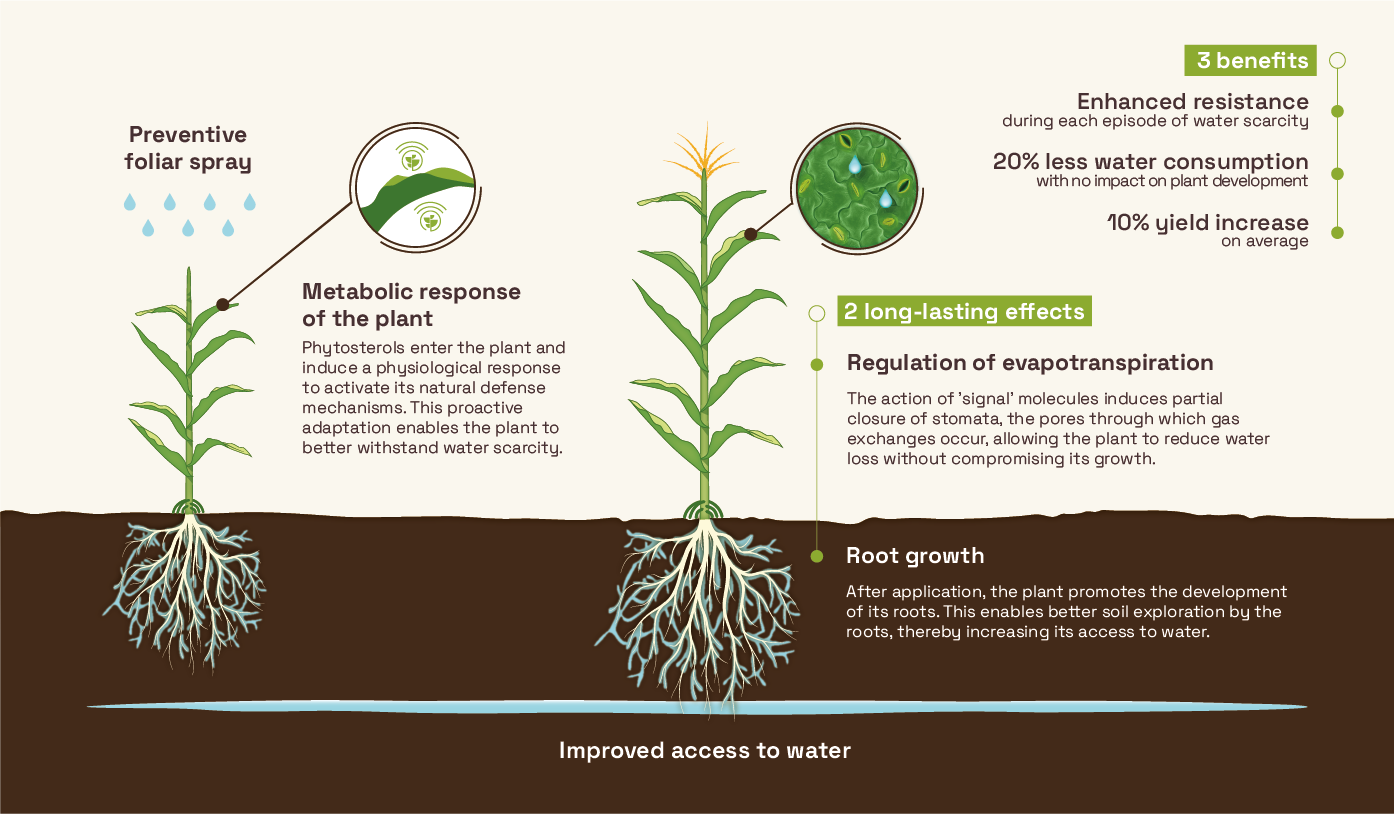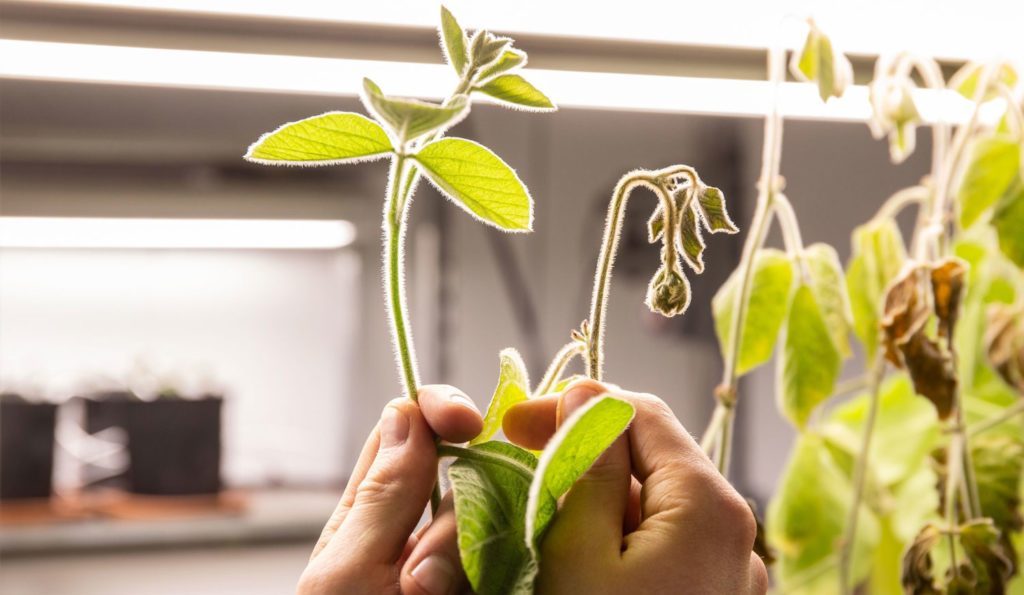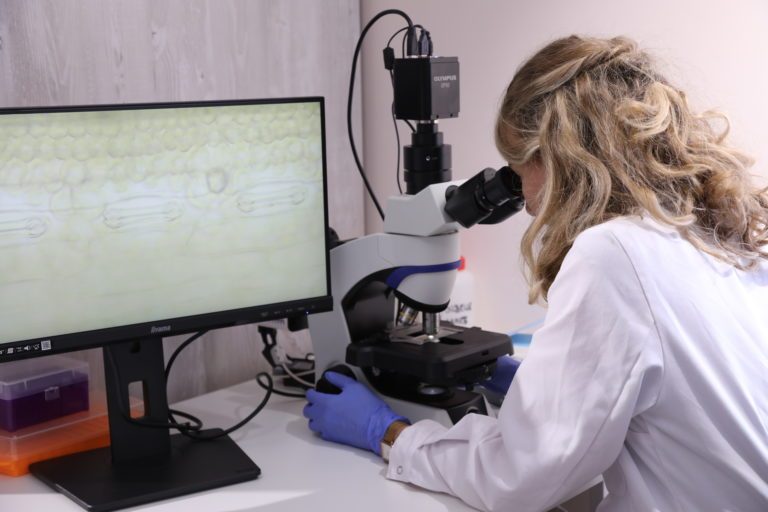Until now, plant protection has essentially relied on applying active substances that target pathogens, insect pests or weeds to make them disappear, using external action and synthetic chemistry in most cases. A new trend has emerged favoring biocontrol solutions, in particular natural defense stimulators and elicitors. The challenge is to mobilize the plant’s own defense mechanisms to counter abiotic stress, making it naturally more robust.
When faced with water shortage, phytosterols (biochemical molecules naturally produced by plants) influence the plant’s internal functioning. They induce physiological and/or resistance reactions to abiotic stress, such as the stress caused by a period of drought or a rise in temperature.
‘Signal’ molecules to arm plants with preventive action
Phytosterols work in a well-identified way. These plant lipids send a signal to plant cells by binding to receptors on plant membranes, triggering a chain of biochemical reactions that stimulate the expression of genes involved in physiological reactions, ultimately increasing tolerance to stress. Elicit Plant uses this mechanism to formulate solutions which have proven effectiveness in a wide range of soil and weather conditions, throughout the world. Today, Elicit Plant is the only agri-biotech player to use these molecules and to have specialized in combating water shortage in field crops – the crops most likely to be affected by this type of stress.
Application of these ‘signal’ molecules puts plants on alert by triggering their defense reactions in advance, thus enabling them to adapt even before the stress occurs, however slight or occasional it may be. In the event of real exposure to stress, the plants are already prepared, having acquired the necessary resistance to cope. The consequences are visible and measurable: reduced water requirements and therefore better management of available resources; partial stomata closure to limit evapotranspiration; and increased root development to gain access to more water reserves. The results are clear to see on the crops themselves: increased ‘stay-green’ effects, larger spikes, greater biomass, and a consequent increase in yields. These results have been demonstrated by multi-year trials on corn, sunflower, soybean and straw cereals in a variety of weather and soil conditions, and on different continents. Yield increases have averaged 570 kg per hectare and even reached up to 2+ metric tons.

Healthy plants optimize the effects of phytosterols
Applying phytosterols is all the more effective when crops are in good health and are following an optimal crop itinerary, from sowing to harvesting. Healthy plants are able to make the most of what these innovative solutions provide.
Phytosterols always work in the same way, and the results obtained are consistent and can be reproduced.
The effects of phytosterols also depend on agri-climatic conditions. The more intense the drought, the more visible the product’s contribution. Additional applications of phytosterols have the greatest impact when there are recurrent ‘micro’ water shortages. The phytosterols buffer the effects of drought between two water inputs, preserve plant development, and therefore the associated yields.
Plants express their full genetic potential in ideal weather conditions, when they do not lack water. In these instances, the phytosterols applied have no adverse effects on the crops, either in terms of production or yield levels. Additional applications harbor no risk as their action remains neutral.
Given the ever more unpredictable weather conditions, it is strongly recommended to apply phytosterols every year. In the future, we can expect increasingly frequent periods of water shortage when plants need water most. Furthermore, this technology has the advantage of taking preventive action to limit the impact of water shortage on yields. Our analyses undeniably demonstrate the value of multi-year applications, which can be likened to an insurance policy. Today, we all know that crops will suffer periods of water shortage, we just don’t know when, how intensely, or for how long. Natural defense mechanisms stimulated by phytosterols as a preventive measure give crops an extra chance to resist better and ensure higher yields.
Another major advantage is that phytosterols do not cause phytotoxicity. Given their highly specific mode of action, you just need to comply with the recommended dose and stage of application in order to benefit from their full effectiveness. Use of phytosterols therefore naturally aligns with farming practices respectful of humans and the environment, working with ‘positive plant health’ in mind.
With the right technology, the right dose and the right positioning, every farmer is assured of optimizing their crop management and boosting crop health without harming the plants.




